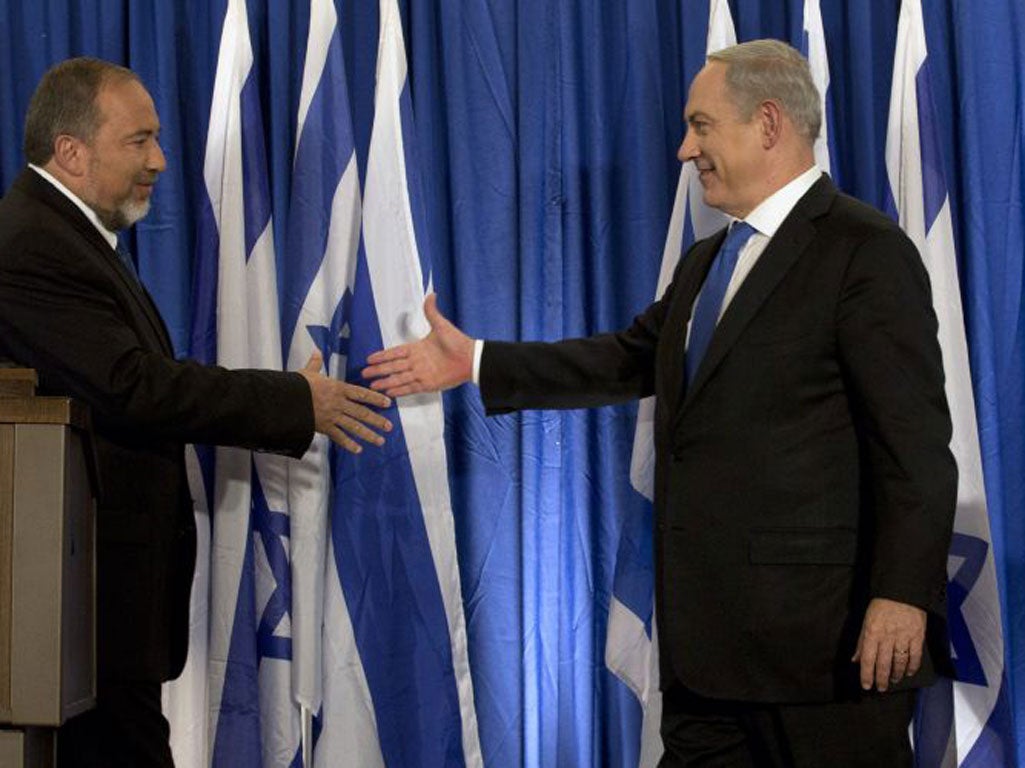A golden handshake – or an error that could cost Israeli Prime Minister Benjamin Netanyahu power?
Alliance with hardline Foreign Minister’s party threatens to alienate moderate supporters

The Israeli Prime Minister Benjamin Netanyahu's big political gamble to join forces with ultra-nationalists before early elections in January threatened to backfire today as signs emerged that the new alignment could alienate moderate voters.
In a surprise announcement late on Thursday, the hawkish premier sketched out the details of a tie-up between his ruling Likud party and Yisrael Beitenu, led by the Foreign Minister, Avigdor Lieberman. Disunited centrists factions condemned the alliance as an "extremist leadership".
Mr Netanyahu hopes the alignment will give him a substantial majority in the next Knesset, the Israeli parliament, and the popular mandate he needs to formulate a strategy, possibly a military one, to defeat Tehran's nuclear ambitions. The decision to run alongside Mr Lieberman, a former nightclub bouncer who lives in a West Bank settlement, will raise eyebrows not only in Israel but also in the West, where he is largely shunned.
But Mr Netanyahu, whose unstable coalition includes Mr Lieberman's party and four other parties with narrow interests that have threatened the coalition's survival, said he needed "a big, cohesive force" behind him that would allow him to focus on "the main issues, rather than trifles".
Preliminary opinion polls suggested that Mr Netanyahu, who seemed assured of victory in the 23 January ballot even without Yisrael Beitenu, could have alienated voters put off by Mr Lieberman's brand of politics.
A survey for Channel 2 television yesterday suggested the two parties would take 33 out of 120 seats in parliament, fewer than the combined 39 seats an earlier poll found they would get if they ran separately. "Unifying lists usually shrinks them," wrote Nahum Barnea in Israel's biggest-selling newspaper, Yedioth Ahronoth. "Anyone who did not tolerate Lieberman and voted for Netanyahu will think twice, and the same is true for those who did not tolerate Netanyahu and voted for Lieberman."
More dangerously for Mr Netanyahu, his tilt to the right could galvanise the lacklustre centrist opposition. Yesterday's poll suggested that Labour and Yesh Atid, the strongest opposition parties, would take 27 and 18 seats in the Knesset, respectively, up from the 19 and 15 seats earlier forecast.
The opposition could receive an even bigger boost, say analysts, if either Tzipi Livni, the centrist former opposition leader, or Ehud Olmert, a one-time Prime Minister preoccupied with his own legal troubles, were to announce their decision to run on a pro-peace platform to counter the perception of a far-right government with little interest in reaching a deal with the Palestinians.
But the appeal by the Labour leader, Shelly Yacimovich, for other parties to form a unity list behind her to defeat Mr Netanyahu gained little support, and Yesh Atid claimed it was now the only party appealing to the "moderate and respectable Israeli majority".
Mr Netanyahu's new alliance still has hurdles to overcome, with some Likud lawmakers threatening to thwart the deal, which still has to be approved by the party's central committee.
The partnership is likely to have profound consequences for Israeli policy, towards both Tehran and the Palestinians, enabling Mr Netanyahu to form a war cabinet that would allow him to claim a popular mandate to take Israel into a military confrontation with Iran. The premier has repeatedly portrayed Iran's nuclear ambitions as an existential threat to Israel.
"From now on, only American opposition is liable to delay, or even prevent, a command to the Israeli Air Force to take off for Iran," wrote Aluf Benn, the editor of the left-leaning Haaretz newspaper, adding that Likud would now become "a radical right-wing party … that revels in Israel's isolation and sees the Arab community as a domestic enemy and a danger to the state".
Left-leaning politicians said the Lieberman-Netanyahu alliance would torpedo what remains of the peace process, which has stalled over the continued expansion of Jewish settlements on occupied Palestinian territory. "The Prime Minister is essentially signalling that he has chosen the extremist, pro-settlement right ... not to make progress in the diplomatic process," Zehava Galon, head of the liberal Meretz party, told Israel's Army Radio.
Mr Lieberman has appealed to his pro-settler base with his contentious and uncompromising views on the Palestinian question, proposing to transfer Israeli Arabs to Palestinian control in the event of a peace deal, and branding Mahmoud Abbas, the moderate Palestinian leader, as an "obstacle to peace."
Subscribe to Independent Premium to bookmark this article
Want to bookmark your favourite articles and stories to read or reference later? Start your Independent Premium subscription today.

Join our commenting forum
Join thought-provoking conversations, follow other Independent readers and see their replies